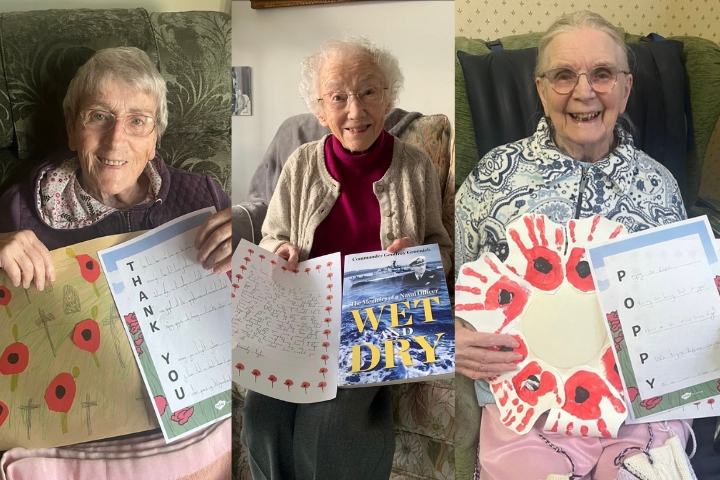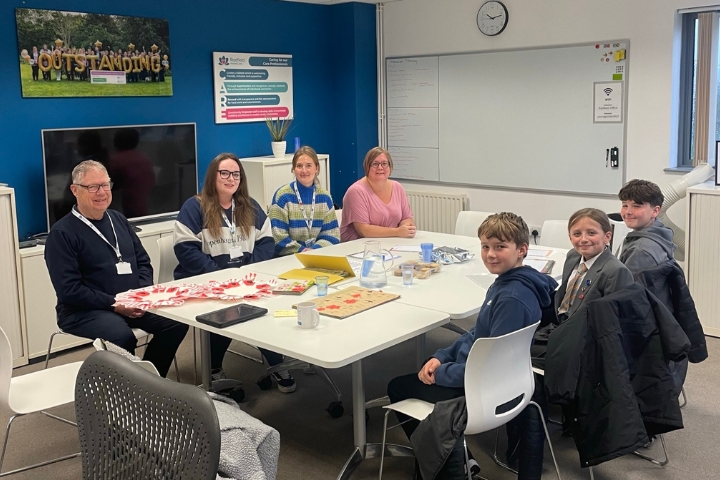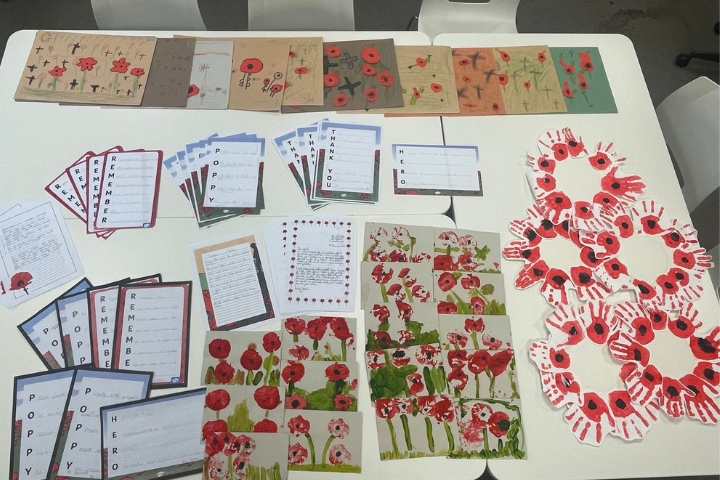Radfield Home Care Bexhill, Hastings & Battle: Intergenerational Remembrance Project
28 November 2023
Written bySamuel Holmes

National Office
Please enter the office location/term above to receive results for your closest office as well as information matches
At Radfield Home Care Bexhill, Hastings & Battle, we believe in the importance of promoting intergenerational activities in our local community. This month, we worked with a local school to commemorate Remembrance Day.

Children from Ark Little Ridge Primary Academy produced themed work about Remembrance Day. The whole school got involved: the older children wrote poems and letters to our clients, while the younger children produced some wonderful artwork including pictures of poppies, handprint poppy wreaths and crosses.
Children from the school council delivered the work to our offices and met some of our staff who talked to them about our clients. Our care professionals then delivered the letters and artwork to around twenty of our clients while out on their care visits.
The children’s work stimulated a lot of our clients to reflect on their own experiences during the Second World War. Many wrote back to the children to share some of their own wartime memories including details about food rationing, clothes coupons, family members who served, being evacuated or taking in evacuees, and having their homes bombed.
Jenny, who was born in 1951, shared memories of rationing, which continued until 1954.
Margaret was 12 when the war began, and she shared some stories, including how difficult it was to get petrol, needing to carry her “beastly gas mask” everywhere, and having to use National Margarine instead of butter. She wrote, “Unfortunately when we baked a cake using this margarine it caught fire and ruined our oven. We had to hire another oven after that.”
Not all of our clients were children during the war. Brian was 19 and in the RAF. He wrote back to the children about how uncertain life was, as well as some of the important work that he did. He talked about some of the saddest parts of his job, but also mentioned that he did have good times with his friends in the RAF.
Our clients were really pleased to receive the work from the children. Many of them wrote back, and lots were also eager to dig out their own photos and mementoes from wartime and reminisce. For many, this was a really positive experience, as it provides a purposeful activity through which they can reconnect with important life events and past achievements.
Having a mixture of art and written work was also really helpful for our clients. Some were able to write long letters to the children, including Sheila, who wrote four pages back to Nicky. Others were supported by partners or family members to write back, and some were more able to engage with the visually stimulating artwork gifted to them.
Many of the clients shared their wishes for peace in the future with the children.
Maggie, who was 9 when war broke out, wrote, “War meant blackouts, rationing, air-raids and for me – nine years old – fear! Your work delighted me – thank you all. My very good wishes to you and I hope you will grow up in a more peaceful world.”
Brenda finished her letter by saying, “After 1945 life gradually improved and we are very lucky to live in this beautiful peaceful country. Always remember that. With my best wishes to you all.”

Society tends to segregate communities by age, which allows each generation to see itself as a separate entity rather than an integral part of a larger community. Just 5% of the people living in the same neighbourhood as someone under 18 are over 65, compared to 15% in 1991. These age groups also often have more in common than is generally acknowledged e.g. feeling lonely and isolated at times and experiencing a range of life transitions.
Pieces of work like this are therefore important in developing a greater sense of community together with the effective support networks to prevent social isolation and loneliness.
The participant children learnt about real wartime experiences from people living in their community. They were even able to have some of their questions about the Second World War answered directly. Our clients were able to talk and write about their memories which is both a stimulating and constructive activity.
Intergenerational projects like this are therefore hugely beneficial for both children and older people.
The children involved benefit by getting to interact with and learn from older people. This is especially important for children who have younger parents or may not have grandparents or great-grandparents in their own families.
Children who have contact with older people are less likely to believe in negative stereotypes around older people and ageing. More of them will understand that older people are very similar to them and face many of the same challenges as they age.
Studies across the UK have found that older people who take part in intergenerational projects may have a variety of physical and mental benefits, including:
Many older people taking part in our project told us that they felt less worried in general and feel positive about the future after hearing from younger people.
These benefits are reported both in people who are generally healthy, as well as those with care needs, including those diagnosed with dementia.
Lots of people also say that they appreciate feeling useful and being able to share their experiences, as our clients did with the children in this project.
Many older people are at risk of isolation and loneliness. This risk is higher for people who have been widowed or bereaved, have poor health, live alone or struggle to leave their home. Even if someone receives regular care visits, they may still feel lonely. One in 12 people over 50 in England say that they are often lonely.
Social contact, including receiving letters, is an important way to reduce isolation, and also doesn’t require people to leave their home, which may be difficult or cause a lot of anxiety.
The team at Radfield Home Care Bexhill, Hastings & Battle are going to put together a presentation which the school can use as a resource. We’ll collect some of the key stories and messages for the school, and the Head Boy and Girl will present them to the rest of the school during an assembly.
The letters and pictures received by our clients will be a lasting reminder of the project. Many of our clients have put the pictures up in their homes and enjoy seeing them every day!
Get in touch with your local Radfield Home Care office today and find out more about the support we offer and the difference we can make.